

REGISTERED OFFICE
Plot 4970, Manda Road,
Industrial Area,
Lusaka, Zambia
Tel:+260 211 369 000
Fax:+260 211 369 050
Postal Address:
Private Bag 17, Woodlands,
Lusaka, Zambia
We value your feedback and comments and are always eager to hear from you. Whether you have a specific query or simply want to share your thoughts, feel free to reach out. You can contact one of our representatives directly or fill out our thoughts and questions form for a prompt response.
For media inquiries, please contact media@zambeef.co.zm
For investor relations inquiries, please contact ir@zambeef.co.zm
For general inquiries , or if you would like to become a Novatek agent, please fill out our feedback and questions form.
Zambeef Products Plc has zero tolerance towards corruption. We remain committed to being a responsible corporate citizen and are dedicated to maintaining integrity and transparency in our community. To safely and anonymously report any unethical behaviour or misconduct that you have witnessed or experienced, please fill out the feedback and questions form with as much detail as possible. Every report is handled with the utmost seriousness and discretion.
03/07/2017
Zambeef looks to lessen dependence on in-organic fertilizers
LUSAKA, ZAMBIA – Zambeef Products aims to increase the use of organic compost in its cropping division and lessen the dependence on in-organic fertilisers through a pioneering composting project.
Zambeef is in its third year of running the compositing project which uses a ‘windrow composting’ method in the production of the organic fertiliser from the organic waste on the farm. ‘Windrow composting’ involves piling organic waste in long rows in the field and regularly turning it to control temperature, add or remove moisture and, improve oxygen content. The finished product is then used in the various crop fields on the farm.
“Sustainability is the major factor behind this initiative; Zambeef places high value on maintaining the integrity and quality of the soil. As an integrated agricultural entity, it makes good business sense – fertile soil when coupled with good cropping practices will then translate in better and higher yields,” said Zambeef’s Huntley Farm General Manager Francis Mondomona.
Mr Mondomona added that the success of the project so far had shown that it is possible to incorporate sustainable and conservation farming methods into a commercial farming operation such as Zambeef’s and that the composting of animal and other organic waste available at the farm is not only good for the environment, but also works to the reduce costs of farming inputs, savings from which can then be invested elsewhere and further increase efficiencies across the group.
Zambeef produced 400 tonnes of organic compost in 2016 from its Huntley Farm in Chisamba alone, and expects increased production as the project continues to take shape and expand.
“The decomposition of the manure takes about three months depending on the temperature, when it’s hot it is a bit quicker, when its cooler it takes a bit longer, but on average it’s about three months. After we harvest the wheat, the straw goes to the chickens as bedding…they do the droppings on it…that is the manure; it all comes here, that is what we decompose,” explained Zambeef Arable Crops Manager Edward Njamba.
Mr Njamba, who oversees the project, noted that aside from improving soil conditions, organic compost increases the soil’s water retention capacity: “Once we’ve done this for a couple of years and have improved the organic material in the soil we should be able to cut the in-organic fertiliser use on the farm.”
Zambeef is highly committed to the preservation of biodiversity in the areas of operations and this is reflected in its business model, which takes into account the environmental, ecological and social impact of its operations in the pursuit of economic gains with a view to apply sustainable methods of operations.
Another environmental initiative that Zambeef instituted at Huntley Farm and has worked well is the treatment ponds it introduced in 2013. The ponds function to break down effluent for at least three months before discharge. The move was commended by the Zambian Environmental Management Agency (ZEMA) in recognition of the positive improvements towards sound environment management practices at the farm.
This environmental accountability extends to Zambeef’s other farms with the company looking to replicate the success of the ‘windrow cropping’ composting system there as well. The Zampalm plantation in Mpika already processes waste material into other raw materials for finished products or recycling them for compost.
The approach fits well with the company’s integrated business model which focuses on zero wastage and value addition along the supply and in 2015 earned Zambeef the 2015 Award for consistency in complying with Environmental Impact Assessment Regulations from the Zambia Environmental Management Agency (ZEMA). The award recognises the company’s consistency in ensuring that projects or developments undertaken were preceded by the execution of an Environmental Impact Assessment in accordance with the requirements of the Environmental Management Act, which addresses issues regarding environmental protection, pollution control and challenges arising from climate change, pollution from persistent organic pollutants and electronic waste.
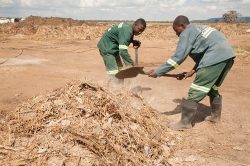 Zambeef workers preparing organic compost at the company’s Huntley Farm in Chisamba. |
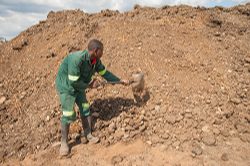 Zambeef workers preparing organic compost at the company’s Huntley Farm in Chisamba. |
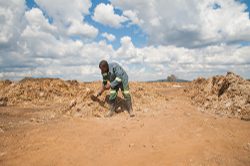 Zambeef workers preparing organic compost at the company’s Huntley Farm in Chisamba. |
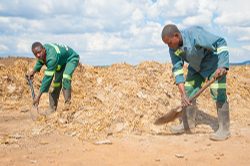 Zambeef workers preparing organic compost at the company’s Huntley Farm in Chisamba. |
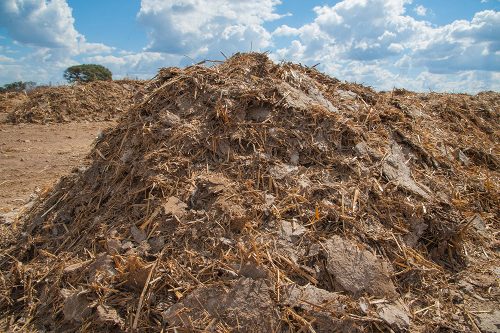 Zambeef Products aims to increase the use of organic compost in its cropping division and lessen the dependence on in-organic fertilisers through a pioneering composting project. |
|
Zambeef Products Plc is the largest integrated agribusiness and food processing company in Zambia and one of the largest in the region.
The group is principally involved in the production, processing, distribution and retailing of beef, chicken, pork, milk, dairy products, eggs, stockfeed and flour. The group also has large row cropping operations (principally maize, soya beans and wheat), planting 16,500 hectares in summer and 8,000 hectares in winter. The group is also expanding its West Africa operations in Nigeria and Ghana.
The company slaughters around 70,000 beef cattle, 6.75million chickens and 70,000 pigs per annum, while also processing 16 million litres of milk, producing 150,000 tons of stockfeed, 60 million eggs, 78,000 pairs of shoes and processes 97,500 hides in its tannery per year.
It has 177 retail outlets throughout Zambia and West Africa.
Zambeef employs over 6,000 people with a total of K307 million paid in remuneration and benefits in the last year, and contributed K144m to Government in taxes and duties.
More information is available at www.zambeefplc.com